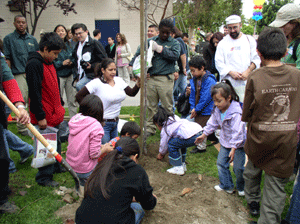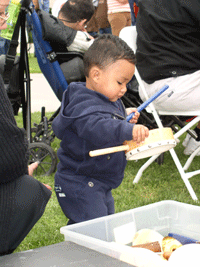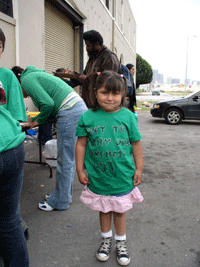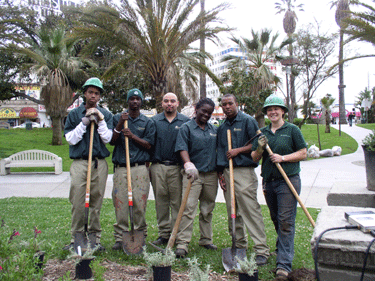Que Viva La Tierra
Air Date: Week of April 28, 2006

The group Mujeres de la Tierra plants a tree in Bell, CA (Photo: Ingrid Lobet)
Latinos have been active on smog and asthma issues for several years, but some leaders want to broaden that into a new Latino activism for urban parks and greenspace. Living on Earth's Ingrid Lobet reports.
Transcript
CURWOOD: Latinos have become increasingly active in environmental causes. For many out West, the link has been asthma and air pollution. Now, some political activists are trying to broaden the focus and create a Latino urban greening agenda, beginning in the sun-baked grayscape of Los Angeles. They hope to seize this moment while hundreds of thousands of Latinos are already mobilized against harsh anti-immagration proposals. Living on Earth’s Ingrid Lobet reports from a bus tour of several Latino Earth Day events.
MAN: So, just go ahead and browse around, huh?
WOMAN: Yeah, help yourself to food. There's burritos, there's bread, there's coffee now.
MAN: Thank you, ma'am.

(Photo: Ingrid Lobet)
[ACCORDIAN MUSIC]
LOBET: Last year, for the first time, there was a Latino Earth Day observance here. A single event. This year there are five celebrations, so there's a bus to go between them.
MAN: Diez, nueve, ocho…
LOBET: As it shoves off, spirits are high.
GROUP OF PEOPLE: Three, dos uno, andale! Let's go. [CLAPPING, ACCORDION]
[BUS NOISE; STREET AND STAGE NOISE]
GONZALEZ: Bueno dias! The idea behind all of this is that as Latinos we have to fight to protect our environment. Our air quality, our water, and community health. We must mobilize for the environment the same way we have taken action on immigration.
LOBET: That’s Antonio Gonzalez, a major figure in Latino politics. He heads two key organizations – the Southwest Voter Registration Project and the William C. Velasquez Institute, which organized the bus caravan.

A little girl shows off her shirt which says “Don’t Take Away Our Dreams” as Earth Day events begin in L.A. (Photo: Ingrid Lobet)
LOBET: Gonzalez says he's well aware of the need to sell his agenda to his constituents. That's why he's here today. But he says some mainstream environmental groups need to yield in their thinking, too. For example, it won't work to frame environmental problems, as some in the Sierra Club argued recently, as too many people.
GONZALEZ: They have to understand that this is a reinterpreted agenda. We have a slogan that we like to use: "From tofu to chile verde." We're not going to eat tofu. Chile verde is just as good.
[SOUND OF DIGGING]
LOBET: Nearby in a park that residents and police have wrenched back from drug dealers, Darnell Jackson and Maynard Jimenez in the Los Angeles Conservation Corps are wishing more people would do what they do every day – plant trees.
|
Darnell Jackson and Maynard Jimenez of the L.A. Conservation Corps (2nd and 3rd from left) on Earth Day. (Photo: Ingrid Lobet) [SHOVELING SOUND]JIMENEZ: They say, ‘what are you guys doing?’ We are fixing up your park. They say, ‘oh, you know, that's cool.’ They like it. It makes me happier. JACKSON: It's amazing, actually, because we can look back on it later on and say, ‘yeah, we helped do this, we helped better the community.‘ JIMENEZ: It is a bad area of LA, but we make it look decent, at least. LOBET: Serenading the youths from a few yards away is a group of university students from Guatemala City. Another group that’s pushing for parks and planting trees here, a Latino youth soccer association, invited the students up from Guatemala who have come up just for this event. [ANDEAN MUSIC] [AIR BRAKES, BUS COMES TO A STOP] MAN: Good afternoon everybody. I want to welcome you to the South Central Farm. This is a project that has been running for 14 years. LOBET: Another stop takes the caravaners to, what organizers say is, the largest urban community garden in the United States. The owner of this 14-acre parcel has been fighting to evict the gardeners and develop the property. MAN: Community growing food, fresh produce, healthier food on their table and help out their families.  The group Mujeres de la Tierra plants a tree in Bell, CA (Photo: Ingrid Lobet) WATERS: This garden, this land is so precious because not only does this land feed people, this land helps us to breathe in South Central Los Angeles! WOMAN: Thank you for visiting the South Central Farmer on Earth Day. Please take your plants, take your plantitas. [BUS STARTS] LOBET: The bus starts for home. It’s been a long day. The take away message, organizers hope, is “speak up.” RAUL HINOJOSA: We didn’t hear you. El que no habla, Dios no lo oye. YARELI ARIZMENDI: El que no habla organizadamente ....Dios no lo oye. LOBET: As the saying goes in Spanish; if you don’t speak up, God won’t hear you. For Living On Earth, I’m Ingrid Lobet in Los Angeles. Living on Earth wants to hear from you!Living on Earth Newsletter [Click here]
Donate to Living on Earth! NewsletterLiving on Earth offers a weekly delivery of the show's rundown to your mailbox. Sign up for our newsletter today!
|






